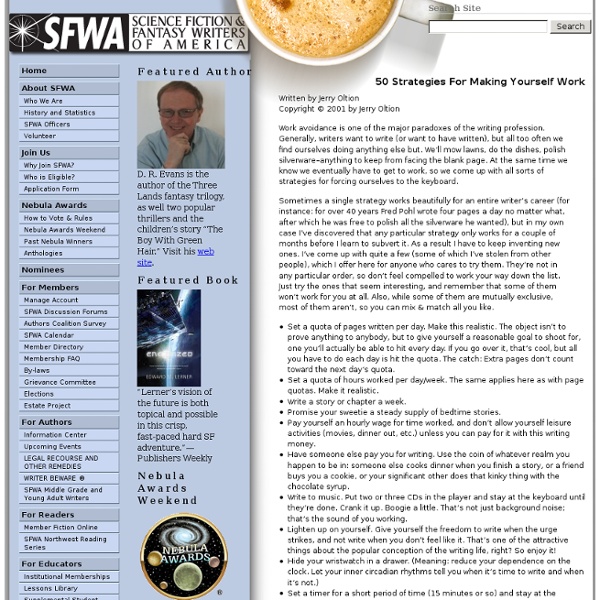How to Write Thousands of Words Every Single Week
How much do you write every week? It’s probably not as much as you’d like. A few years ago, I had all day, every day to write – but I’d still end up spending the whole of Monday writing a couple of pages for my critique group.
The 19 Rules Of Inference
The 19 Rules of Inference Edip Yüksel The prototype disbeliever who is challenged by the number 19 is described as the one who makes erroneous inferences (74:18-20). The repetitious reference to his fallacious logic emphasizes the importance of thinking and inferring properly. God has embedded in our hardware and system software the rules of logical thinking (rooh and aql), which amazingly work perfectly in harmony with the rules of external or natural world. If we employ these rules they will help us to understand God’s law in the nature and the scripture.
20 Common Grammar Mistakes That (Almost) Everyone Makes
I’ve edited a monthly magazine for more than six years, and it’s a job that’s come with more frustration than reward. If there’s one thing I am grateful for — and it sure isn’t the pay — it’s that my work has allowed endless time to hone my craft to Louis Skolnick levels of grammar geekery. As someone who slings red ink for a living, let me tell you: grammar is an ultra-micro component in the larger picture; it lies somewhere in the final steps of the editing trail; and as such it’s an overrated quasi-irrelevancy in the creative process, perpetuated into importance primarily by bitter nerds who accumulate tweed jackets and crippling inferiority complexes. But experience has also taught me that readers, for better or worse, will approach your work with a jaundiced eye and an itch to judge. While your grammar shouldn’t be a reflection of your creative powers or writing abilities, let’s face it — it usually is. Who and Whom
Not a Cool Facade
16 Apr. 2014 comment + criticism welcome `Perceptions' ITEM Copyright © 2012 Ray Dickenson
Themes & Things To Keep In Mind When Writing Fantasy Stories and Adventures » Daily Encounter
This list is far from complete. It’s not even trying to be complete. It knows better than that. It just wants to be helpful and provide some inspiration here and there; you know, offer little suggestions that might lead to bigger ideas. (Especially by using the words offered as Wikipedia searches!)
Russian Scientist Claims to Have Found Cure for Aging
Could there really be one pill that keeps you young indefinitely? This news recently hit the media (link), and the headlines so far have been pretty wild. Catchphrases like "forever young" and "secret to eternal life" will surely spark interest even among the non-immortalist crowd, but how much of it is just hype? So what is this news all about? The drug in question is the work of professor Vladimir Skulachev, who has dedicated his life to study (and solve) aging. Now he's finally found an antioxidant with anti-aging properties and plans to start selling it in just a few years.
Writer’s Digest - Writing Prompts
Write a scene that includes a character speaking a different language, speaking in a thick accent, or otherwise speaking in a way that is unintelligibe to the other characters. (Note: You don't necessarily need to know the language the character is speaking—be creative with it!) Describe a character's reaction to something without explaining what it is.
Cognitive Design
Good Designers Read Your Mind – But How? April 13th, 2014 In cognitive design we spend a lot of time trying to understand what people are really thinking and feeling. We need to understand their mental models, cognitive biases and emotional states so that we can design products and services that meet deeply felt psychological needs. So I am always on the lookout for new scientific insights into how to read others peoples’ minds.
Stocking Stuffers: 13 Writing Tips From Chuck Palahniuk
*Editor's Note: This column is part of a collection of 36 total essays on the craft of writing by Chuck Palahniuk. They were submitted starting in 2005, so this essay will refer to thinks in the past and therefore be on an older timeline. Twenty years ago, a friend and I walked around downtown Portland at Christmas. The big department stores: Meier and Frank… Fredrick and Nelson… Nordstroms… their big display windows each held a simple, pretty scene: a mannequin wearing clothes or a perfume bottle sitting in fake snow. But the windows at the J.J.
My tiny-little-bigger-than-average Neon Rubix Cube
#candy #loverhearts Filed under loverhearts candy Everyone is entitled to their opinion, and more than entitled to feel the way they want. I just wish sometimes these opinions and emotions were based on facts, rather than hearsay and irrational assumption. People do crazy things spurred by heightened emotions. Immature people blame others rather than looking at their own choices.
25 Insights on Becoming a Better Writer
When George Plimpton asked Ernest Hemingway what the best training for an aspiring writer would be in a 1954 interview, Hem replied, “Let’s say that he should go out and hang himself because he finds that writing well is impossibly difficult. Then he should be cut down without mercy and forced by his own self to write as well as he can for the rest of his life. At least he will have the story of the hanging to commence with.”



